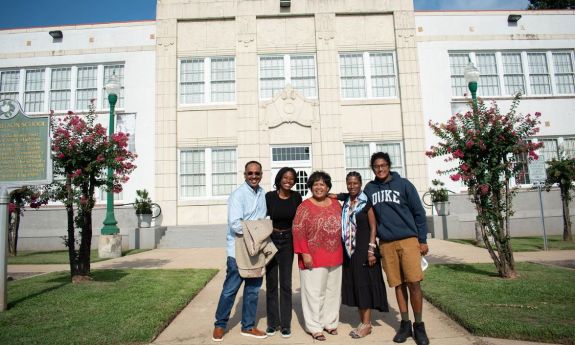Students Ensure Mississippi’s Civil Rights History Isn’t Left in the Past
Robertson Scholars create process to preserve the stories of a new generation of activists


Both Smith and Jammulapati are Robertson Scholars who were dispatched to Cleveland, Mississippi, for their Community Summer – an internship in one of four locations across the South that all Robertson Scholars complete after their freshman year to foster community and leadership. Their project was to create a digital archive that describes this living history for the federally supported Mississippi Delta National Heritage Area (MDNHA), which is managed by Delta State University and has hosted Robertson Scholars for internships every summer for more than 15 years.
The students became so engrossed in their digital storytelling, it lasted far beyond the summer. Although they were only committed to the program for eight weeks, they took their time, reading extensive resources on civil rights in the Delta and establishing ethical standards for conducting their work, Jammulapati said. For example, the pair would spend hours getting to know their interview subjects before ever bringing out a camera or a microphone, Smith said.
They interviewed more than a dozen people before sitting down at the end of the summer for the lengthy process of updating the website for the MDNHA digital archive and producing nine original videos, along with photos, audio and other media. When they needed a brief music track to open all the videos, Jammulapati broke out a harmonica and laid a simple riff atop a funky bassline so each video would start by paying homage to the Delta’s Blues legacy. The pair put the finishing touches on the project in January.
The videos include interviews with activists such as Mary Frances Dear-Moton and Amanda Dear-Jones, the daughter and granddaughter of civil rights organizer Rachel Parker Dear, and Reena Evers-Everette, the daughter of activists Medgar and Myrlie Evers.

When Smith was a child, her parents spent time teaching her about civil rights activists, including Medgar Evers, who was murdered in 1963 after lauded efforts through the NAACP to desegregate schools and support equal voting rights for African Americans. The opportunity to meet and interview Evers-Everette was one of the most memorable moments of her life, she said.
“A lot of what she talked about in her interview was intensely personal,” Smith said. “You can read about her and her family, but it’s different to hear those words come from her and hear the more personal and reflective components of that history. It was truly incredible.”
“I remember just sitting there, listening intently to what she was saying, almost afraid to say anything for fear of breaking this almost sacred quality about the words she was saying, because she has lived through so much and has been fighting for so long,” Jammulapati said.
The students say they hope to have laid the groundwork for future Robertson Scholars interns to continue adding stories to the archive.
“The goal is not for it to be a one-and-done kind of project,” Jammulapati said. “It can be an ongoing system of recording and sharing stories of the Mississippi Delta, because not only were we recording stories and producing them to go on the website, we were also documenting our methodology, reflecting on what we did wrong, what we could do better, and compiling that. So that is hopefully useful to students who work on the project in the future.”
Both described their experiences as unforgettable.
“I don’t think I have ever felt as connected to a piece of land and its importance in everyone’s day-to-day life like I felt walking through Mississippi,” Smith said. “Whether that was Clarksdale, or whether that was Cleveland – there’s a special connection that people have there to their history, to the land, and to each other that is indescribable. And that is what I will look back on.”